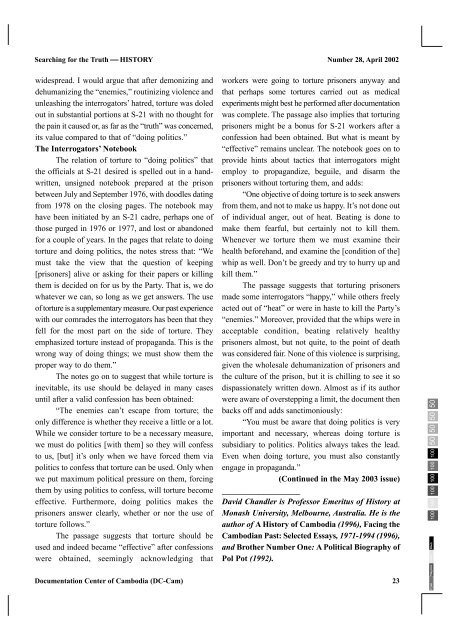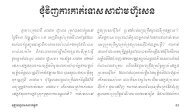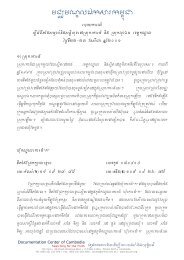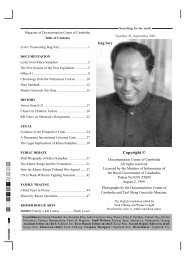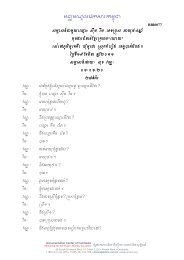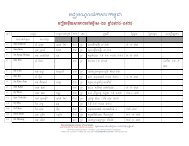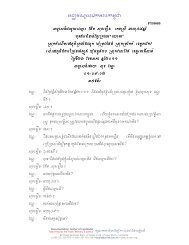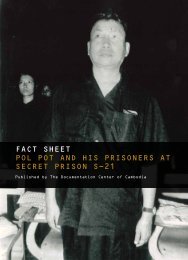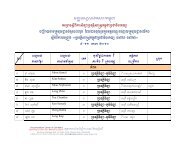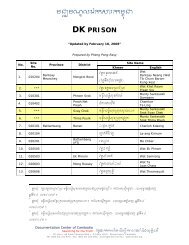Searching for the truth Issues 28 - Documentation Center of Cambodia
Searching for the truth Issues 28 - Documentation Center of Cambodia
Searching for the truth Issues 28 - Documentation Center of Cambodia
You also want an ePaper? Increase the reach of your titles
YUMPU automatically turns print PDFs into web optimized ePapers that Google loves.
<strong>Searching</strong> <strong>for</strong> <strong>the</strong> Truth ⎯ HISTORY<br />
widespread. I would argue that after demonizing and<br />
dehumanizing <strong>the</strong> “enemies,” routinizing violence and<br />
unleashing <strong>the</strong> interrogators’ hatred, torture was doled<br />
out in substantial portions at S-21 with no thought <strong>for</strong><br />
<strong>the</strong> pain it caused or, as far as <strong>the</strong> “<strong>truth</strong>” was concerned,<br />
its value compared to that <strong>of</strong> “doing politics.”<br />
The Interrogators’ Notebook<br />
The relation <strong>of</strong> torture to “doing politics” that<br />
<strong>the</strong> <strong>of</strong>ficials at S-21 desired is spelled out in a handwritten,<br />
unsigned notebook prepared at <strong>the</strong> prison<br />
between July and September 1976, with doodles dating<br />
from 1978 on <strong>the</strong> closing pages. The notebook may<br />
have been initiated by an S-21 cadre, perhaps one <strong>of</strong><br />
those purged in 1976 or 1977, and lost or abandoned<br />
<strong>for</strong> a couple <strong>of</strong> years. In <strong>the</strong> pages that relate to doing<br />
torture and doing politics, <strong>the</strong> notes stress that: “We<br />
must take <strong>the</strong> view that <strong>the</strong> question <strong>of</strong> keeping<br />
[prisoners] alive or asking <strong>for</strong> <strong>the</strong>ir papers or killing<br />
<strong>the</strong>m is decided on <strong>for</strong> us by <strong>the</strong> Party. That is, we do<br />
whatever we can, so long as we get answers. The use<br />
<strong>of</strong> torture is a supplementary measure. Our past experience<br />
with our comrades <strong>the</strong> interrogators has been that <strong>the</strong>y<br />
fell <strong>for</strong> <strong>the</strong> most part on <strong>the</strong> side <strong>of</strong> torture. They<br />
emphasized torture instead <strong>of</strong> propaganda. This is <strong>the</strong><br />
wrong way <strong>of</strong> doing things; we must show <strong>the</strong>m <strong>the</strong><br />
proper way to do <strong>the</strong>m.”<br />
The notes go on to suggest that while torture is<br />
inevitable, its use should be delayed in many cases<br />
until after a valid confession has been obtained:<br />
“The enemies can’t escape from torture; <strong>the</strong><br />
only difference is whe<strong>the</strong>r <strong>the</strong>y receive a little or a lot.<br />
While we consider torture to be a necessary measure,<br />
we must do politics [with <strong>the</strong>m] so <strong>the</strong>y will confess<br />
to us, [but] it’s only when we have <strong>for</strong>ced <strong>the</strong>m via<br />
politics to confess that torture can be used. Only when<br />
we put maximum political pressure on <strong>the</strong>m, <strong>for</strong>cing<br />
<strong>the</strong>m by using politics to confess, will torture become<br />
effective. Fur<strong>the</strong>rmore, doing politics makes <strong>the</strong><br />
prisoners answer clearly, whe<strong>the</strong>r or nor <strong>the</strong> use <strong>of</strong><br />
torture follows.”<br />
The passage suggests that torture should be<br />
used and indeed became “effective” after confessions<br />
were obtained, seemingly acknowledging that<br />
<strong>Documentation</strong> <strong>Center</strong> <strong>of</strong> <strong>Cambodia</strong> (DC-Cam)<br />
Number <strong>28</strong>, April 2002<br />
workers were going to torture prisoners anyway and<br />
that perhaps some tortures carried out as medical<br />
experiments might best he per<strong>for</strong>med after documentation<br />
was complete. The passage also implies that torturing<br />
prisoners might be a bonus <strong>for</strong> S-21 workers after a<br />
confession had been obtained. But what is meant by<br />
“effective” remains unclear. The notebook goes on to<br />
provide hints about tactics that interrogators might<br />
employ to propagandize, beguile, and disarm <strong>the</strong><br />
prisoners without torturing <strong>the</strong>m, and adds:<br />
“One objective <strong>of</strong> doing torture is to seek answers<br />
from <strong>the</strong>m, and not to make us happy. It’s not done out<br />
<strong>of</strong> individual anger, out <strong>of</strong> heat. Beating is done to<br />
make <strong>the</strong>m fearful, but certainly not to kill <strong>the</strong>m.<br />
Whenever we torture <strong>the</strong>m we must examine <strong>the</strong>ir<br />
health be<strong>for</strong>ehand, and examine <strong>the</strong> [condition <strong>of</strong> <strong>the</strong>]<br />
whip as well. Don’t be greedy and try to hurry up and<br />
kill <strong>the</strong>m.”<br />
The passage suggests that torturing prisoners<br />
made some interrogators “happy,” while o<strong>the</strong>rs freely<br />
acted out <strong>of</strong> “heat” or were in haste to kill <strong>the</strong> Party’s<br />
“enemies.” Moreover, provided that <strong>the</strong> whips were in<br />
acceptable condition, beating relatively healthy<br />
prisoners almost, but not quite, to <strong>the</strong> point <strong>of</strong> death<br />
was considered fair. None <strong>of</strong> this violence is surprising,<br />
given <strong>the</strong> wholesale dehumanization <strong>of</strong> prisoners and<br />
<strong>the</strong> culture <strong>of</strong> <strong>the</strong> prison, but it is chilling to see it so<br />
dispassionately written down. Almost as if its author<br />
were aware <strong>of</strong> overstepping a limit, <strong>the</strong> document <strong>the</strong>n<br />
backs <strong>of</strong>f and adds sanctimoniously:<br />
“You must be aware that doing politics is very<br />
important and necessary, whereas doing torture is<br />
subsidiary to politics. Politics always takes <strong>the</strong> lead.<br />
Even when doing torture, you must also constantly<br />
engage in propaganda.”<br />
(Continued in <strong>the</strong> May 2003 issue)<br />
___________________<br />
David Chandler is Pr<strong>of</strong>essor Emeritus <strong>of</strong> History at<br />
Monash University, Melbourne, Australia. He is <strong>the</strong><br />
author <strong>of</strong> A History <strong>of</strong> <strong>Cambodia</strong> (1996), Facing <strong>the</strong><br />
<strong>Cambodia</strong>n Past: Selected Essays, 1971-1994 (1996),<br />
and Bro<strong>the</strong>r Number One: A Political Biography <strong>of</strong><br />
Pol Pot (1992).<br />
23<br />
100 100 100 100 100 100 50 50 50 50<br />
Black<br />
Yellow<br />
Magenta<br />
Cyan


